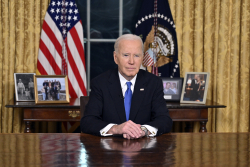Why do the United States and its European allies have such different approaches on tech policy, and what are the geopolitical costs?
As the global economy pivots toward digital innovation and AI supremacy, tensions are mounting not just between rivals like the U.S. and China, but also among traditional allies. In a panel discussion hosted by The National Interest on May 8, policy experts unpacked both the growing friction and potential cooperation between the United States, the United Kingdom, and the European Union over tech policy.
The panel featured Yaël Ossowski of the Consumer Choice Center and Paul Steidler of the Lexington Institute. Moderated by Paul Saunders, president of the Center for the National Interest, the conversation provided a candid picture of a fragmented but interdependent transatlantic tech landscape.
Ossowski opened the discussion with a blunt assessment of U.S.-EU digital friction. While Europe advances sweeping tech regulations like the Digital Services Act and Digital Markets Act, American firms such as Google, Apple, and Meta are finding themselves hit with growing compliance costs and regulatory penalties. “We have fines that have now been issued against most of the major American tech companies,” Ossowski explained. “At the same time, Trump is using the stick of trade relationships to protect American companies.”
Steidler, meanwhile, emphasized the geopolitical stakes, tying digital policy directly to the larger great power rivalry with China. “Whoever is dominant in AI is going to be the world leader for the next century,” he warned. “This is about who is going to have the strongest military power. It’s about who is going to have the systems and the platforms that are going to drive economic growth and prosperity.” Partnerships will remain essential for the U.S. in this 21st century arms race. And one key partner stands out: the UK.
Britain, Steidler noted, has emerged as a strong transatlantic tech ally, with a robust AI sector and political leadership committed to fostering tech investment. A newly announced U.S.-UK tech trade framework may signal a turning point and help establish “a beachhead in Europe for tech expansion.”
But cooperation isn’t simple. The panel touched on British digital taxes and its Online Safety Act, which some critics argue mirror EU-style overreach. Nonetheless, both panelists remained cautiously optimistic that regulatory alignment, or at least coexistence, was possible, particularly given shared democratic values and economic interests.
In an era of digital authoritarianism and cyber threats, experts agree that stronger U.S.-UK-EU tech alignment will bolster both markets and national security.
Yaël Ossowski is Deputy Director of the Consumer Choice Center, a fellow at the Bitcoin Policy Institute, and a longtime journalist, analyst, and advocate on technology policy. He recently wrote “How Donald Trump Can Beat Europe’s Tech Regulations” for The National Interest.
Paul F. Steidler is a Senior Fellow at the Lexington Institute, where his work focuses on federal policy on technology and logistics. His recent work for TNI includes “The Case for a U.S.-UK Tech Alliance.”
Paul J. Saunders is the President of the Center for the National Interest.
Image: Shutterstock.
















